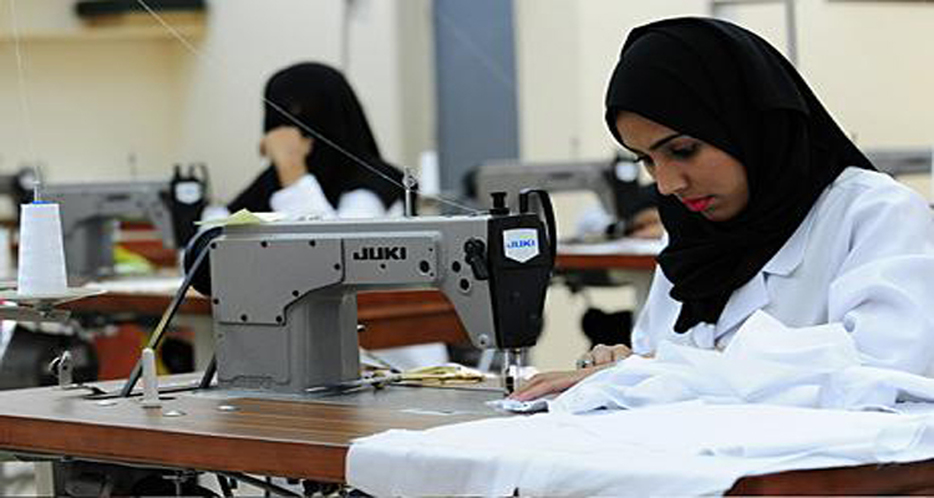Saudi Arabia (original) (raw)
Women's Workforce in Saudi Arabia
Women's rights in Saudi Arabia are restricted in contrast to many of its neighbours. Saudi Arabia is ranked 127th out of 136 countries for gender equality. Gender roles in Saudi Arabia society have come from Sharia or Islamic law. The Islamic law is based on the Quran and Hadith.
According to the International Labor Organisation, Saudi women constitute 18.6% of the native workforce. The rate of participation has grown from 15.3% in 1990 to 18.6% in 2011 and 14.6% of workers in the public and private sectors of the Kingdom are women. When foreign emigrant workers are included in the total, the percentage of working Saudi women drops further to 6.1%.This compares with over 40% in Muslim nations such as Kuwait or Malaysia. Some people complain that this creates an undermining of women's skills, since females make up 70% of the students in Saudi schools and universities. Some jobs taken by women were reserved for men in Saudi Arabia. The Saudi delegation to the United Nations International Women's Year conference, in Mexico City, in 1975 and the Decade for women conference in Nairobi in 1985, was made up entirely of men.
Employment for women has a number of restrictions under Saudi law and culture. According to the Saudi Labor Minister Dr. Ghazi Al-Qusaibi he said "the Labor Ministry is not acting to promote women's employment since the best place for a woman to serve is in her own home.Therefore, no woman will be employed without the explicit consent of her guardian (a male figure). We will also make sure that the [woman's] job will not interfere with her work at home with her family, or with her eternal duty of raising her children.
A woman's work must also be considered suitable for the female strength and mindset. Women are allowed to work only in places in which they can serve women only; there must be no contact or interaction with the opposite gender. A woman's work should not lead to her traveling without a close male relative—which presents considerable problems as women are not allowed to drive motor vehicles and there is little or no public transportation in the Kingdom.
Therefore until 2005, women worked only as doctors, nurses, teachers, women's banks, or in a few other special jobs where they had contact only with women. Almost all of these women had college and graduate degrees, and worked either in schools, where men were not allowed to teach girls, or in hospitals, because traditional families prefer that female doctors and nurses treat their wives, sisters, and daughters. Jobs such as judges, and positions of high public office were forbidden for women.
Women's banks were an improvement allowed in 1980 to give women a place to put their money without having to have any interaction with men. The banks employ women exclusively for every position, except for the guards posted at the door to see that no men enter by mistake. "Usually a guard was married to one of the women employees inside, so that if documents had to be delivered he could deal with his wife rather than risking even the slight contact taking place between unmarried members of the opposite sex." The number of Saudi women working in banking grew from 972 in 2000 to 3,700 in 2008.
When women do work jobs also held by men, they often find it difficult to break into full-time work with employee benefits like allowances, health insurance and social security. According to a report in the Saudi Gazette, an employer told a female reporter that her health insurance coverage did not include care for childbirth, but that of a male employee included such coverage for his wife.
Saudi women are now seen developing professional careers as doctors, teachers and even business leaders, a process described by in 2007 by ABC News as "painfully slow". Prime examples include Dr. Salwa Al-Hazzaa, head of the ophthalmology department at King Faisal Specialist Hospital in Riyadh and Lubna Olayan, named by Forbes and Time as one of the world's most influential businesswomen.
Some firsts in Saudi women's employment occurred in 2013, when the Kingdom registered its first female trainee lawyer, Arwa al-Hujaili, its first female lawyer to be granted an official license from its Ministry of Justice Bayan Mahmoud Al-Zahran, and the first female Saudi police officer Ayat Bakhreeba. Bakhreeba earned her master’s degree in public law from the Dubai police academy and is the first police woman to obtain a degree from the high-level security institute. Additionally, her opinion on “children’s rights in the Saudi system” was chosen as the best research paper by the police academy.

Saudi Arabian women working in a sewing shop.